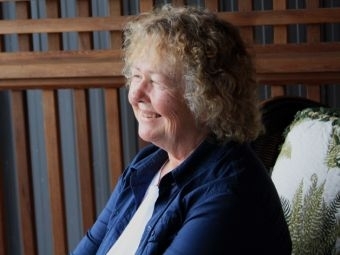 (Host) An East Wallingford woman who faced felony charges for growing marijuana for her critically ill son will not have to go trial.
(Host) An East Wallingford woman who faced felony charges for growing marijuana for her critically ill son will not have to go trial.
As VPR’s Nina Keck reports, state prosecutors have referred Sue Thayer to a Court Diversion program. Her case will be dismissed if she successfully completes it.
(Keck) For over three years, 65-year-old Sue Thayer has been trying to convince the Vermont legal system that she doesn’t deserve to be a felon.
She freely admits she broke the law when she grew a large amount of medical marijuana for her son Max. But she says she did it to save his life as marijuana seemed to be the only that helped him feel better as he underwent daily dialysis and waited for a kidney transplant.
The state, however, disagreed – arguing that in order to legally grow medical marijuana in Vermont, she had to do it indoors and in much smaller quantities.
While prosecutors had offered her several plea deals, Thayer says as the parent of a sick child, she didn’t feel she had done anything wrong.
(Thayer) "I couldn’t look at myself and say I’m a felon and I’m going to go plead guilty you know it would be immoral for me to say that."
(Keck) Earlier this month, Deputy State’s Attorney Peter Neary referred Thayer’s case to the court diversion program. Thayer says it’s a welcome compromise.
(Thayer) "At this point I think it is the best thing for everyone concerned. And I think in the end, Peter Neary heard the people who were saying, wait a minute this lady isn’t a felon and she shouldn’t be prosecuted in that matter."
(Keck) Thayer’s legal problems began in 2007 when police confiscated more than 25 marijuana plants outside her home.
The Wallingford woman says she felt a jury would understand why she grew the plants and planned to use what’s called a necessity defense – arguing that she broke the law to help save her son’s life.
But a Rutland District Court judge ruled her case didn’t qualify for that defense because a medical marijuana law existed in Vermont and Thayer chose not to follow it.
In a controversial three to two ruling, the State Supreme Court agreed. That left Thayer unable to explain herself to a jury and facing possible jail time.
Dozens of her friends and neighbors picketed the courthouse last November in protest.
Now with the option of court diversion, Thayer looks forward to having the her case dismissed if she completes the community service.
(Thayer) "I was really excited about that because this has been a stressful time for us and I have not had a chance to do a lot of the kinds of community service like I did before this all came down."
(Keck) Thayer and her son Max, who turned 23 this week and successfully received a kidney transplant last April – say they’re looking forward to getting their lives back.
Both say they plan to use their experiences to speak out about medical marijuana in Vermont and encourage state lawmakers to make it easier to get.
For VPR news, I’m Nina Keck.